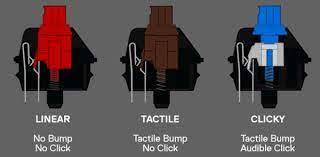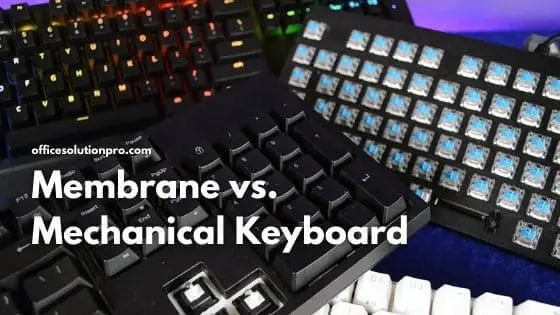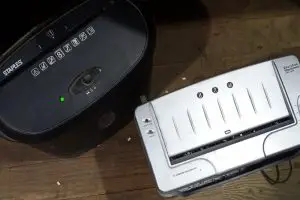When designing an office space, small details like a desktop keyboard may not be on your list of necessities. After all, keyboards are so common that you may not even know different types of keyboards exist.
But, when looking to update your computer setup, you may decide between a mechanical keyboard or a membrane keyboard. So, what is the difference between membrane vs. mechanical keyboards?
The biggest difference between membrane and mechanical keyboards is tactile feedback.
Mechanical keyboards create a distinct click sound when a key is pressed, providing direct feedback to the user. Membrane keyboards, on the other hand, are much quieter because each keycap presses down on a thin membrane layer. Membrane keyboards are more common than mechanical keyboards too.
You may not care about the differences between the two if you’re a casual computer user. However, if you are a hardcore gamer or an expert typist, using the right keyboard can be the difference between having a dreadful day or a wonderful one. In this post, we will explore membrane vs. mechanical keyboards.
At Office Solution Pro, we are passionate about Ergonomics! Our readers support the page. If you click on a link, we may earn a small commission at no cost to you. We hope you love the products we recommend as much as we do!
Differences Between Mechanical and Membrane Keyboards:
What is a Membrane Keyboard?
A membrane keyboard is a computer keyboard whose keys are not separate. It uses 3 flexible layers, with a membrane layer at the top and conductive traces at the bottom. When a key is pressed, it moves through the layers until it makes contact with the conductive traces at the bottom.

Image was originally uploaded to Wikipedia by Fourohfour.
Unlike mechanical keyboards, the keys on a membrane keyboard must pop back up for the next key to register.
Because of its simple design, membrane keyboards are cheaper to produce, so they are much more affordable than mechanical keyboards. However, since the keys rely on repetitive tension to complete a circuit, membrane keyboards often have shorter lifespans and do not last as long as mechanical keyboards.
1. Pros of Membrane Keyboards
Quieter Than Mechanical Keyboards
The biggest advantage membrane keyboards have over mechanical keyboards, is arguably, its low noise. They are not only quieter than their mechanical counterparts, but are also smoother on the fingers, especially when the user is typing on the keyboard at a very high speed.
In the hands of expert typists, some mechanical keyboards, especially ones with blue switches, can be very loud. The noise may disturb others, especially if they are working with other people around them. So if you want to type peacefully without noise, then a membrane keyboard is your best bet.
More Affordable
Because membrane keyboards are designed for regular computer users (who write a few emails and perform a few Google searches a day), they are generally cheaper than their mechanical counterparts. It’s easy to find affordable membrane keyboard options because they are much more common too.
More Compact and Portable
Membrane keyboards are often made with cheaper materials like plastic, making it lighter, more compact, and much more portable than mechanical keyboards. It is rare to see people on the move bringing their mechanical keyboards with them, as they are more suitable for a PC at home or at the office.
Freelancers, remote workers, and digital nomads rely more on membrane keyboards when they are travelling because of their portability. In fact, some membrane keyboards have options which are not only small, but ergonomic too. They are perfect to bring along with you anywhere you go.
2. Cons of Membrane Keyboards
Does Not Give a Satisfying Typing Feeling
Expert typists often seek mechanical keyboards because of their amazing tactile feedback. Unfortunately, the unique clicky sound found in mechanical keyboards are absent in membrane keyboards. So if you type without looking, you may have trouble identifying each key press.
While the example seems a bit extreme, typing on a membrane keyboard can feel like typing on “mashed potato”. The point is that the difference between typing on a mechanical keyboard and a membrane keyboard is worlds apart. You can identify each key press on a mechanical keyboard, but not on a membrane keyboard.
Shorter Lifespan
Unlike mechanical keyboards, membrane keyboards generally have shorter lifespans and can wear out faster. This is due to the materials used to create the keyboards. Mechanical keyboards are made with more premium and durable materials, while membrane keyboards are often made with cheaper materials.
Harder to Clean
Mechanical keyboards have individual keycaps that are removable, making them easier to clean. On the other hand, membrane keyboards often do not have separate keycaps, making it harder to thoroughly clean the inside of the hardware. The keys on membrane keyboards are not removable too.
No N-Key Rollover
We’ve mentioned earlier that the keys on a membrane keyboard must pop back up for the next key to register. That is what’s called N-Key Rollover.
N-Key Rollover, or NKRO, is a keyboard’s ability to detect all keystrokes, no matter how many keys are pressed at the same time. It means that there are no limits to how many keys can be pressed and registered at once. This feature is only found in high-end keyboards, not on membrane keyboards.
What is a Mechanical Keyboard?
A mechanical keyboard is a computer keyboard that has switches under each key to send typing signals, instead of the rubber membrane layers found in most common keyboards. Each key on a mechanical keyboard has its own switch, which comes with a base, a spring, and a stem.
Unlike membrane keyboards, a mechanical keyboard can register several keys at once. This feature is called N-Key Rollover.

Mechanical keyboards usually provide exchangeable keycaps, which allow users to mix-and-match their mechanical keyboard based on their preference. There are basically three types of switches found on mechanical keyboards: Linear switches, tactile switches, and clicky switches.
- Linear switches are the simplest ones. There is no significant noise or tactile feedback whenever the key is pressed. As a result, linear switches are generally the quietest of all the three switches.
- Tactile switches give tactile feedback. You will notice a small bump as you press a key down. In other words, you know when you’ve successfully registered a key.
- Clicky switches provide an additional click sound on top of the tactile feedback. Like tactile switches, clicky switches you don’t have to push a key all the way down to type — you can release the key immediately after you receive the feedback.
Mechanical keyboards are not only sought-after by hardcore gamers, but they are also enjoyed by expert typists for professional purposes. For people used to mechanical keyboards, it’s hard to go back to using membrane keyboards. Now let’s take a look at some of the pros and cons of mechanical keyboards:
1. Pros of Mechanical Keyboards
N-Key Rollover
The biggest reason why mechanical keyboards are enjoyed is because of N-Key Rollover, or NKRO. It is the ability to scan each button press individually, even though several buttons are pressed simultaneously. This feature is very useful for gaming as it involves a huge number of key combinations.
All of the best mechanical keyboards for typing have N-Key Rollover. Often you will see the “N” in N-Key Rollover replaced with a number. That number shows you how many keys you can press at once. If a mechanical keyboard has a 10-key rollover, it means that you can press ten keys at once.
Heavy and Durable
A heavy keyboard can be seen as a good thing or a bad thing, depending on how you look at it. But for a mechanical keyboard, it is often seen as a positive because it provides better durability than its membrane counterpart. They are more durable because they are made with heavier materials that are built to last.
Removable Keycaps
Being able to remove each keycap serves two purposes: One, it allows you to customize a mechanical keyboard to your liking. And secondly, it allows you to clean a mechanical keyboard thoroughly because you can get in deep into the hardware. In fact, most mechanical keyboards come with keycap removers.
2. Cons of Mechanical Keyboards
More Expensive Than Regular Keyboards
Being heavier, more durable, and longer-lasting than membrane keyboards come at a price. Mechanical keyboards are more expensive than regular keyboards because they are built with heavy-duty materials. So if you’re a casual computer user, we recommend sticking to a regular membrane keyboard first.
Loud Noise May Disturb Others
Mechanical keyboards can be found mostly inside home offices and besides personal computers. It’s rare to find them in communal offices because they can be very loud. Unlike membrane keyboards, the click-clack sound of a mechanical keyboard can annoy people who are trying to focus on getting their work done.
Why Are Mechanical Keyboards Better than Membrane?
Compared to membrane keyboards, many computer and typing enthusiasts believe that mechanical keyboards feel so good and satisfying. Why?
A big reason why mechanical keyboards are better than membranes is because of the direct feedback.
Mechanical keyboards create a distinct click sound when a key is pressed, making it feel so good and satisfying. Membrane keyboards, on the other hand, are quieter because the keycaps press down on a thin membrane layer, reducing the amount of feedback for each key pressed.
That said, everyone has different opinions on what keyboard to use. Some computer typists can be productive whether they use a membrane or mechanical keyboard, while some hardcore gamers exclusively use mechanical keyboards to gain the slightest of advantages over their opponents.
Which One Should You Choose, Membrane or Mechanical?
And there you go, the comparison between membrane vs. mechanical keyboards. At the end of the day, deciding which keyboard to use comes down to what your activities are.
If you are a casual computer user who types once in a while, plays casual games, or is a freelancer working while traveling around the world, then a membrane keyboard that is lightweight, portable, and ergonomic may be the best choice for you. It is more affordable and ideal for beginners too.
On the other hand, if you are a hardcore gamer who plays as if your life depends on it, or an expert typist who spits out words regularly for a living, then a mechanical keyboard should be your preferred weapon of choice. It may be more expensive, but you have the ability to customize your own keyboard.

Stephen Lim
I write about office ergonomics and wellness. Simple changes in the workspace can help produce better health and productivity, both at home and in the office.











